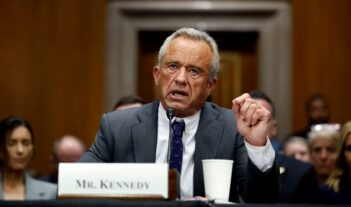
In the United States, disease outbreaks challenge emergency preparedness.
As the novel coronavirus shows, disease outbreaks can spread quickly throughout our increasingly connected world. Behind the scenes of frontline efforts to curb the spread of outbreaks is the herculean task of legal preparedness for these public health emergencies.
The focus on public health emergency preparedness (PHEP) in the United States is only a recent phenomenon. The agencies now primarily responsible for PHEP, such as the Centers for Disease Control and Prevention (CDC), once lacked the capacity and legal authority to take a hands-on approach to local disease outbreaks. But the federal government intervened after a series of anthrax attacks executed through the federal postal system in 2001 constituted a national security threat.
In response, Congress passed legislation to empower HHS in public health emergencies, including establishing an assistant secretary-level position dedicated to PHEP. Meanwhile, the CDC developed the Public Health Emergency Preparedness program—now potentially in jeopardy given the Trump Administration’s proposed $25 million budget cut—to provide guidance, technical assistance, and funding for states and localities responding to disease outbreaks. The CDC also finalized an initial draft of the Model State Emergency Health Powers Act. The Act—which some groups argue is incompatible with privacy and other rights—offered state and local governments a guide for responding to “public health emergencies,” which the CDC defined to include the occurrence of an infection-borne illness posing a high probability of substantial harm or death.
Subsequent threats of Ebola, Measles, and the Zika virus spurred further changes to law and policy, but there remain opportunities for improvement. This seminar highlights scholarly accounts of PHEP for disease outbreaks in the United States.
- “While the law may not be the first public health tool considered in a disaster, it is fundamental to the effective functioning of multiple actors and must be harmonized across jurisdictional lines.” Writing for the DePaul Journal of Health Care Law, Loyola University Chicago School of Law professors John D. Blum and Jordan Paradise highlight shortcomings in PHEP in the United States. Blum and Paradise note that poor coordination among federal agencies and an utter lack of systematic review of public health preparedness activities inhibit the development of best practices. They recommend harmonizing current laws and regulations, developing and continuously updating best practices, addressing the tension between public health emergency responses and individual rights, and prioritizing flexible approaches to individual emergencies.
- In an article published in the Indiana Health Law Review, James Hodge, Lexi C. White, and Sarah A. Wetter criticize a recently revised CDC regulation concerning the agency’s social distancing powers. Under the rule, the CDC can isolate, quarantine, or question “virtually anyone with signs or symptoms of a communicable disease” upon an executive order listing that disease. Hodge and his coauthors assert that, depending on how the rule is implemented, this regulation could be susceptible to legal challenges based on due process claims.
- To handle a wide range of emergencies, “streamlined and flexible legal systems are vital to address the unforeseeable circumstances that disasters create.” Gregory Sunshine, a public health analyst with the CDC, claims in a 2018 Emory Law Journal article that states could simplify their processes for declaring public health emergencies by, for instance, vesting this power in the governor instead of other officials. Sunshine also argues that states can build such flexibility by permitting exceptions to existing regulations when disasters occur, such as by loosening restrictions on pharmacists’ abilities to administer vaccines during an emergency.
- The development of new vaccines is a key strategy to helping reduce the scale and public health impact of future outbreaks of infectious diseases—and intellectual property (IP) plays a key role in vaccine development, Ana Santos Rutschman of Saint Louis University School of Law argues. In a recent UCLA Law Review article, Rutschman uses the recent Ebola and Zika virus outbreaks to analyze the role of IP before, during, and after outbreaks. Unfortunately, inefficiencies in the current IP regime for vaccine development result in a lack of “IP preparedness” that “hinders our ability to respond effectively to outbreaks,” Rutschman concludes. To address some of the inefficiencies, Rutschman proposes a “dormant license,” which would be “agreed upon in the pre-outbreak period, that would become active once a public health emergency is declared.”
- In a recent article in the American Journal of Public Health, Scott Santibañez, Mark Davis, and Rachel Nonkin Avchen argue that the CDC should incorporate Community and Faith-Based Organizations (CFBOs) more effectively into public health emergency responses. They note that in the past decade, CFBOs have played important roles in addressing public health emergencies, such as the 2009 H1N1 Influenza Pandemic, the 2014 domestic Ebola response, and the 2016 Zika response. CFBOs, they explain, can engage with local communities to address stigma, share accurate information, and “support those with family or loved ones in affected areas.” Santibañez and his coauthors propose that the CDC could make “CFBO partnerships a standard part of response efforts” to “help ensure that engagement occurs easily.” State and local public health leadership should work to “sustain existing partnerships” with CFBOs so that new relationships do not need to be built in times of crisis, they argue.
- In an article published in the Journal of Public Health Management & Practice, Amy D. Sullivan, Colten J. Strickland, and Kelly M. Howard argue that PHEP practices are key tools to combat communicable diseases. Sullivan and her coauthors advocate consistently implementing PHEP practices for all “frontline communicable disease preparedness” efforts, and not only when situations “overwhelm routine capabilities.”
The Saturday Seminar is a weekly feature that aims to put into written form the kind of content that would be conveyed in a live seminar involving regulatory experts. Each week, The Regulatory Review publishes a brief overview of a selected regulatory topic and then distills recent research and scholarly writing on that topic.



